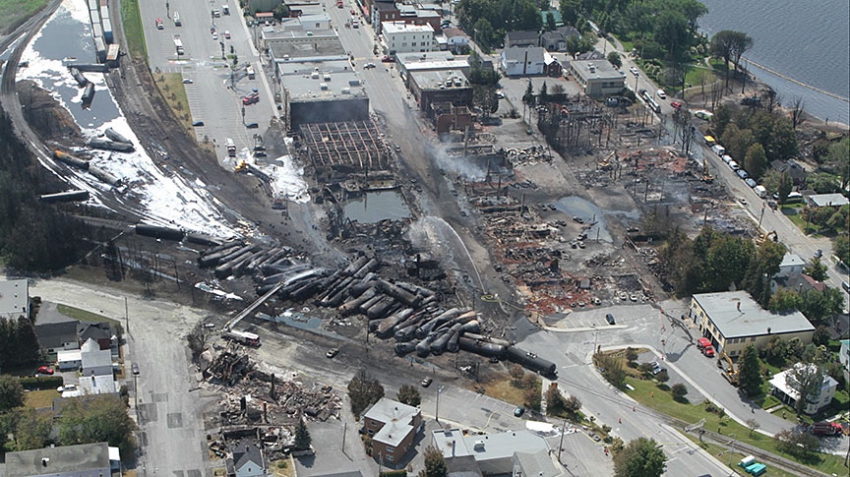Bill C-51 to Lac-Mégantic: How Harper keeps Canadians (un)safe

by Anonymous Author
When the first images emerged of mangled rail cars in the backdrop of flames roaring through downtown Lac-Mégantic, many suspected that they were witnessing the gruesome aftermath of a terrorist attack. Investigations by Transport Safety Board of Canada soon revealed, however, that the real culprit behind the carnage that killed 47 people in this small Quebec town was the Harper government.
“In addition, although MMA had developed a safety management system in 2002, Transport Canada’s regional office in Quebec did not audit it until 2010—even though this is Transport Canada’s responsibility, and despite clear indications (via inspections) that the company’s safety management system was not effective,” TSB wrote in their damning report. “Transport Canada Headquarters in Ottawa, meanwhile, did not effectively monitor the Region’s activities. As a result, it was not aware of any weaknesses in oversight of regional railways in Quebec, and it did not intervene.”
“Our Government is serious about taking action to keep Canadians safe,” Prime Minister Harper said as he unveiled his government’s anti-terrorism legislation in the wake of the attacks which led to the deaths of Corporal Nathan Cirillo and Warrant Officer Patrice Vincent last October. “Recent terrorist actions in Canada are not only an attack on our country, but also our values and our society as a whole.”
While Bill C-51 gives the authorities, in the words of legal scholars Ken Roach and Craig Forcese, “extraordinary powers” that are “capable of chilling constitutionally-protected speech, and ultimately proving an offence that undermines more promising avenues of addressing terrorism,” the government claimed it had no power to prevent a repeat of Lac-Mégantic-type catastrophe.
“We need to remember that in terms of safety, the government puts the rules in place. The companies are expected to follow the rules,” Transport Minister Raitt said in response to the TSB report. “The company did not follow the rules and that’s a very important fact here too.”
Ms. Raitt should have added that it was the government itself that gave up the power to enforce those rail safety rules through deregulation, deregulation which has helped rail companies reap record profits.
The Harper government did not stop there.
When CP rail employees went on strike against dangerous working conditions that could lead to another rail disaster with train engineers getting little or no breaks between shifts, the government was quick to table back-to-work legislation to bust the strike.
Prior to Bill C-51 the threshold for pre-emptive arrest was that a suspect “will carry out an act of terrorism”. Bill C-51 lowers that threshold by allowing law enforcement agencies to arrest anyone who “may carry out an act of terrorism”.
We have a government that has appropriated itself potentially unconstitutional powers with that may keep Canadians safe, while relinquishing powers that will keep Canadians safe.



